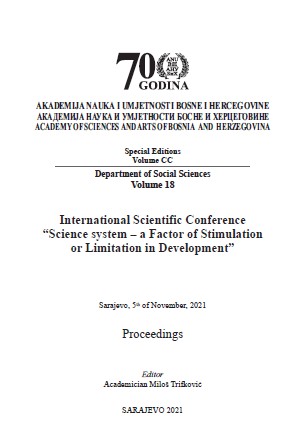Influence of development of scientometrics on the outlook and functioning of the science system in the world and in individual countries
Influence of development of scientometrics on the outlook and functioning of the science system in the world and in individual countries
Author(s): Enver Zerem, Suad Kunosic
Subject(s): Higher Education , State/Government and Education
Published by: Akademija Nauka i Umjetnosti Bosne i Hercegovine
Keywords: internationally recognized criteria; academic community; education; ranking web of world universities;
Summary/Abstract: The social significance and quality of scientific research largely depend on the usefulness of research results for the social and scientific community. The lack of funds and the desire to allocate funding to high-quality research projects make the assessment of the quality of research and the valorization of knowledge increasingly important. However, it is very difficult to apply criteria that can objectively assess scientific research, providing precise qualitative and quantitative data on which funding agencies could base their decisions. The product of scientific research is mainly information published in scientific journals. They are the basis for the dissemination of knowledge and the basic criteria for academic and scientific evaluation, fundraising for scientific research and career advancement. In addition to the evaluation of scientific publications, there is a wide range of other activities that reflect the scientific credibility of scientists, such as: number and quality of grants for scientific research projects, leadership in national or international academic societies, membership in editorial boards of reputable journals, doctoral dissertation mentorships and the like. Although these activities are important and give credibility to the scientist, the relevant scientometric systems cover only publications, neglecting other criteria of scientific importance in evaluation for purpose of academic advancement of a scientist, as well as competitions for grants for financial support of scientific research. The reason for this is the fact that these activities, regardless of their importance, are very heterogeneous, with specific characteristics, and require very diverse parameters for evaluation. Therefore, there are no universal evaluation criteria for these activities and their quality is generally assessed individually, depending on the purpose of the assessment. Regardless of the shortcomings, university ranking systems are important comparative parameters for assessing the quality of scientific and educational value of universities.
Book: Međunarodna naučna konferencija “Sistem nauke – faktor poticaja ili ograničavanja razvoja”
- Page Range: 365-384
- Page Count: 20
- Publication Year: 2021
- Language: English
- Content File-PDF

